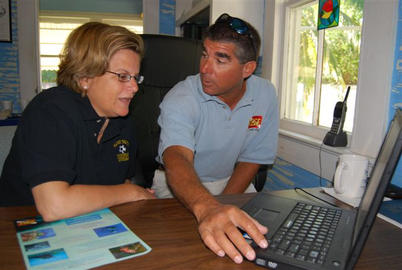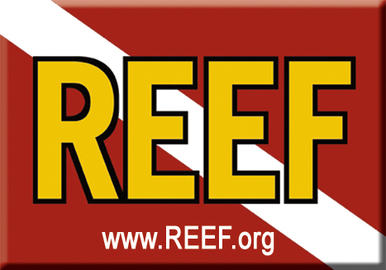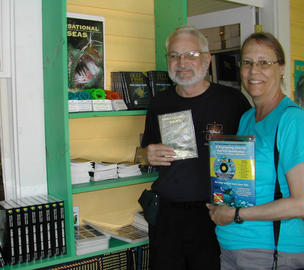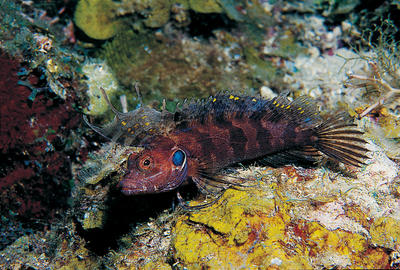Author: Joe Cavanaugh, Director of Field Operations
REEF had the opportunity to attend the 54th Annual Underwater Clinic of Boston Sea Rovers, March 8-9th in Boston, MA. The Boston Sea Rovers has sponsored the “Longest Continuously Running Dive Show in the World.” Each annual clinic attracts as speakers, educators, explorers, scientists, divers and underwater photographers. The purpose of the lectures is to help Sea Rovers achieve the club mission “to educate the general public about the underwater world.” Since 1954, Sea Rovers has held an annual clinic in Boston for the purpose of raising the level of knowledge of the underwater world. Early members of the club invented the first underwater film show or clinic as it was known then and is still called such today. In addition to over 40 speakers this year and many booths at the show, there was the Saturday evening film event which is a must-see showcase of underwater photos and videos from renowned leaders in the field.
Past speakers at the annual clinic include myriad famous names such as Jacques Cousteau, Sylvia Earle, Robert Ballard, George Bond, Peter Gimbel, Stan Waterman, Brian Skerry, Bob Talbot, David Doubilet, and many others. Really, the Sea Rovers history mirrors that of SCUBA diving and the presenters have always been those same individuals who have been pioneers and innovators in diving, underwater science, marine conservation, underwater archaeology and discovery, and photography/videography. I think if I were to describe the Sea Rovers in one sentence, it would be this: If every dive site in the world had 10' viz, 30 degree water temps, 1 fish and one moonsnail to see, it took the entire dive to find said fish and moonsnail, and you had to wear 40lbs in dive weight, there would still be an avid group of SCUBA enthusiasts in the Boston Sea Rovers! The annual event is really the last major dive show in America run solely by volunteers and proceeds from the event are used for scholarships, internships, in support of other non-profit organizations such as SeaMark and the Cotting School for Handicapped Children, and to continue to promote the goals of Sea Rovers.To learn more about the Sea Rovers, please visit http://www.bostonsearovers.com/BSRpublic/library
I also spoke at the New England Aquarium as part of their Lowell Lecture Series and to the Aquarium Dive Club while visiting Boston. The general motivation behind sending this native New Englander back home was to foster new and old liaisons in capacity building in the region. Most people who attended my talks did not know that REEF conducts surveys or has a presence in New England. Part of our goal in participating in the Clinic was to promote REEF programs such as the Great Annual Fish Count; increase our number of regional Field Stations; develop partnerships for utilizing the data that we hope to begin collecting in earnest in the coming year; create a regional list serve for interested individuals to connect on REEF programs; and develop a strategic plan for the region. For our part, REEF is committed to creating a separate New England online data entry interface for our website in the coming month, revamping the NE fish ID curriculum, and hopefully adding invertebrates to this curriculum, developing a NE Advanced Assessment Team (AAT) program, then utilizing this AAT team for regional monitoring and ad hoc conservation efforts. Encouraging regional dive clubs to conduct surveys while on their winter trips in the Caribbean offers another way for NE members to get involved. Stay tuned for more news from our NE partnerships and look to see the New England online data entry up and running very soon. Ultimately, nurturing REEF's survey efforts in New England will benefit many stakeholders just as these survey data currently inform marine management decisions in our other survey regions.
There are a few people I would like to thank here for making this trip possible: Vickie Cataldo (NEAQ Lowell Lecture Coordinator) for her generous travel support to REEF; Dan Laughlin and Sarah Taylor at NEAQ; David Caldwell (Exhibitor/Coordinator of Sea Rovers); David Morton (President Sea Rovers); Bob Michelson for ongoing support of REEF; Terri Rioux (WHOI DSO); Al Bozza (NEAQ Dive Club); and especially Holly Bourbon Martel for arranging my Sea Rovers talk, co-presenting with me, and for taking on the role of Volunteer NE Regional Coordinator for REEF. Also, thanks to The New England Aquarium in Boston and the Coastal Dive Center in Hingham, MA our regional REEF Field Stations. Cape Ann Divers in Gloucester and Divers Market in Plymouth also have recently assisted REEF.
Author: Leda A. Cunningham
On Tuesday, March 4, REEF was pleased to host Congresswoman Ileana Ros-Lehtinen at its headquarters in Key Largo, Florida. Ros-Lehtinen represents Florida’s 18th district, including Monroe County and the Florida Keys. REEF Board and staff discussed the importance of training volunteers in marine conservation to preserving the long-term health of coral reefs in the Florida Keys and worldwide.
“I am thrilled to be visiting REEF and getting a look at their wonderful conservation and diving programs as this group is comprised of those who truly enjoy the beauty and serenity of the seas, divers and marine conservationists,” Ros-Lehtinen said.
The group laid out plans to train volunteers to conduct biological monitoring and assessment of key managed areas through the REEF Volunteer Survey Project. Ros-Lehtinen suggested presenting scientific findings in local schools and pledged to learn to do marine life surveys on her next visit to the Florida Keys. The potential threat posed by exotic invasive lionfish to the Florida Keys reef tract and ways to educate residents about the problem were also discussed.
“This is a great opportunity to share some of the important work REEF is doing to preserve the natural, national heritage of the Florida Keys coral reef ecosystem,” said REEF Executive Director, Leda Cunningham. “We are honored to have the Congresswoman at REEF HQ and look forward to working collaboratively on projects such as training volunteers to collect marine life data and keeping exotic invasive lionfish out of Florida Keys waters.”
Author: Leda A. Cunningham
On Tuesday, February 26 and Wednesday, March 12, REEF hosted two citizen science panel discussions about how volunteers contribute to understanding and preserving the Florida Keys environment. The first discussion, held in Key Largo, featured speakers from the Breeding Bird Survey project, Coral Restoration Foundation, and John Pennekamp State Park native plant nursery. The second event, held in Key West, featured speakers from The Nature Conservancy, Mote Marine Laboratory and the National Weather Service. Both discussions were led by guest speaker Rick Bonney, a pioneer in the citizen science field from the Cornell Lab of Ornithology in Ithaca, NY. Leda Cunningham presented on the REEF Volunteer Survey Project.
Forty-two people participated in the discussions, most of whom were themselves volunteers in a local or national citizen science project. "Most scientists usually only get to attend 'niche' meetings, where everyone in the room is talking about variations of the same subject matter," said Alison Higgins of The Nature Conservancy. "What was amazing about REEF's Citizen Science symposium is that the approach was the same (engaging the public in collecting important observations), but the subjects were varied. I specialize in land conservation issues, but got to brainstorm and engage with fish, bird and weather scientists - It was a really great and necessary experience"
Each discussion group brainstormed next steps for the citizen science movement in the Florida Keys. Ideas included forming an informal coalition of citizen science projects, doing integrated data analysis across project taxa (effect of weather on fish or bird population trends, e.g.), starting a regular citizen science column in a local newspaper and developing a citizen science booklet for residents and visitors to learn about local projects. For more information, please contact Leda Cunningham: Leda@REEF.org.
Author: Bonnie Greenberg, REEF Office Manager
REEF members, Mike and Sharol Carter of California, stopped by headquarters this month during their visit to The Keys. They enjoyed a few great dives and were looking forward to a kayak tour before heading back home.
It's not uncommon for REEF members to travel far and wide for fish-watching and surveying. Sharol ordered the Reef Fish Identification Beginning Course - Florida, Caribbean, Bahamas DVD home study course prior to their travels. She said she was thrilled to recognize local Keys fish and happy for memory tips on the DVD, like the button on the mutton fish which made her fish-watching much more fun.
Thanks to Mike and Sharol for brightening our day with their smiles. We hope to see them again soon, if not here then perhaps on a field survey in the future.
REEF headquarters is located in Key Largo, FL at mile marker 98.3. We are the little yellow conch house in the median. According to local historian Jerry Wilkinson, the building we are in was built in 1913. We're told, it is the oldest standing building in the Upper Keys still in the same location.
If you happen to be visiting The Florida Keys, please don't hesitate to stop in and say hello.
Author: Joe Cavanaugh, Director of Field Operations
Only one space is open for the upcoming Turks and Caicos live-aboard Field Survey, April 19-26th aboard the Aggressor II. We have an ecclectic, well-rounded group of surveyors committed to making this a special trip. Time is running out to join. If you are interested in learning more, please contact Tami at Travel for You (1-888-363-3345) or Joe Cavanaugh at 305-852-0030.
Spaces are also available for the Paul Humann Discovery Tour this summer in Key Largo scheduled June 21-28, 2008. This Field Survey provides a great opportunity for new and seasoned surveyors to interact with renowned marine life author, Paul Humann, and learn from his many years experience, photographing and surveying marine creatures worldwide. Horizon Divers is the dive shop for this trip and also a REEF Field Station. Horizon Divers has worked with REEF on a number of projects over the past several years. Your time on the Discovery Tour will be split between class-work with Paul Humann, learning fish and invertebrate species identification and behavior, and diving multiple sites in Key Largo. Paul will review fish and invertebrate sightings from the dives and incorporate what you are seeing into his classes. Summer diving in the Keys cannot be beat and all the dives will be less than 60 feet depth. There will be opportunities for a night dive and ample time for touring many of the local attractions in the Keys.
If you are interested in Paul's Discovery Tour, please phone Dan Dawson at Horizon Divers (305) 453-3535 (email: info@horizondivers.com), or phone Joe Cavanaugh at (305) 852-0030 (joe@reef.org).














